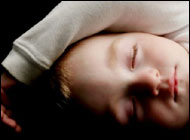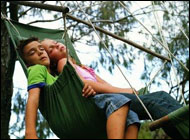Letting infants watch TV can do more harm than good says wide-ranging international review
A leading child expert is warning parents to limit the amount of television children watch before the age of two, after an extensive review published in the January issue of Acta Paediatrica showed that it can do more harm than good to their ongoing development.
Professor Dimitri A Christakis, from the Seattle Children’s Research Institute and the University of Washington, USA, has also expressed considerable concerns about DVDs aimed at infants that claim to be beneficial, despite a lack of scientific evidence.
And he points out that France has already taken the matter so seriously that in summer 2008 the Government introduced tough new rules to protect the health and development of children under three from the adverse effects of TV.
Professor Christakis’ extensive review looked at 78 studies published over the last 25 years and reiterates the findings of numerous studies he has carried out with colleagues into this specialist area.
He points out that as many as nine in ten children under the age of two watch TV regularly, despite ongoing warnings, and some spend as much as 40 per cent of their waking hours in front of a TV.
“No studies to date have demonstrated benefits associated with early infant TV viewing” says Professor Christakis, whose review looked at the effect that TV has on children’s language, cognitive skills and attentional capacity, as well as areas for future research.
“The weight of existing evidence suggests the potential for harm and I believe that parents should exercise due caution in exposing infants to excessive media” he says.
“For example, the American Academy of Paediatrics discourages TV viewing in the first two years of life, but only six per cent of parents are aware of this advice despite ongoing publicity.”
Key findings of Professor Christakis’ review includes:

* 29 per cent of parents who took part in a survey of 1,000 American families published in 2007 said they let their infants watch TV because they thought it was “good for their brains”. But claims made by manufacturers are not substantiated by peer-reviewed medical papers and industry studies.
* Watching TV programmes or DVDs aimed at infants can actually delay language development, according to a number of studies. For example, a 2008 Thai study published in Acta Paediatrica found that if children under 12 months watched TV for more than two hours a day they were six times more likely to have delayed language skills. Another study found that children who watched baby DVDs between seven and 16 months knew fewer words than children who did not.
* Infants as young as 14 months will imitate what they see on a TV screen, but they learn better from live presentations. For example, one study found that children learnt Mandarin Chinese better from a native speaker than they did from a video of the same speaker.
* A study of 1,300 children conducted by the author and colleagues in 2004 found a modest association between TV viewing before the age of three and attentional problems at the age of seven, after a wide range of other factors were ruled out.
* In another study, the author and colleagues looked at the effects of early TV viewing on cognitive development at school age. They found that children who had watched a lot of TV in their early years did not perform as well when they underwent tests to check their reading and memory skills.
* More than one in five parents who took part in another study said that they got their infants to watch TV when they needed time to themselves. This, says the author, is an understandable and realistic need, but not one that should be actively promoted.
But why does television have such a negative effect on children of this age? “We believe that one reason is the fact that it exposes children to flashing lights, scene changes, quick edits and auditory cuts which may be over stimulating to developing brains” says Professor Christakis. “TV also replaces other more important and appropriate activities like playing or interacting with parents.”
There have been concerns about infants viewing TV for the last four decades but it has only been in recent years that studies have provided the empirical data to back up those concerns.
 “The explosion in infant TV viewing and the potential risks associated with it raise several important policy implications” concludes Professor Christakis.
“The explosion in infant TV viewing and the potential risks associated with it raise several important policy implications” concludes Professor Christakis.
“First and foremost, the lack of regulation related to claims made by people promoting programmes and DVDs aimed at infants is problematic. Educational claims should, and can, be based on scientific data. Despite this, the names of the products and the testimonials they use often convince parents that TV viewing has a positive impact on their infants.
“Secondly, parents need to be better informed about what activities really do promote healthy development in young children. This may provide some defence against the aggressive marketing techniques being employed.
“Last, but not least, more resources need to be made available to fund critical research related to the effects of media on young children.”
###
Notes to Editors
* The effects of infant media usage: what do we know and what should we learn? Christakis, D A. Acta Paediatrica. 98, pp 8-16. (January 2009).
* To read the French ruling in English put “Conseil supérieur de l’audiovisuel” into your search engine and press translate this page. The press release appears in the top stories section under the heading “Ruling to protect children under 3 years of the effects of television”.
* Acta Paediatrica is a peer-reviewed monthly journal at the forefront of international paediatric research. It covers both clinical and experimental research in all areas of paediatrics including: neonatal medicine, developmental medicine, adolescent medicine, child health and environment, psychosomatic paediatrics and child health in developing countries.
* About Wiley-Blackwell. Wiley-Blackwell was formed in February 2007 as a result of the acquisition of Blackwell Publishing Ltd. by John Wiley & Sons, Inc., and its merger with Wiley’s Scientific, Technical, and Medical business. Together, the companies have created a global publishing business with deep strength in every major academic and professional field. Wiley-Blackwell publishes approximately 1,400 scholarly peer-reviewed journals and an extensive collection of books with global appeal.
Contact: Annette Whibley
.(JavaScript must be enabled to view this email address)
Wiley-Blackwell